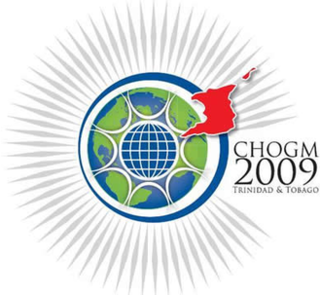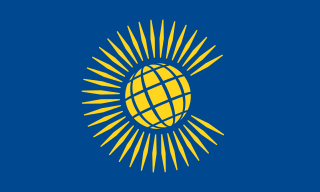The Commonwealth Heads of Government Meeting is a biennial summit meeting of the governmental leaders from all Commonwealth nations. Despite the name, the head of state may be present in the meeting instead of the head of government, especially among semi-presidential states. Every two years the meeting is held in a different member state and is chaired by that nation's respective prime minister or president, who becomes the Commonwealth Chair-in-Office until the next meeting. Queen Elizabeth II, who was the Head of the Commonwealth, attended every CHOGM beginning with Ottawa in 1973 until Perth in 2011, although her formal participation only began in 1997. She was represented by the Prince of Wales at the 2013 meeting as the 87-year-old monarch was curtailing long-distance travel. The Queen attended the 2015 summit in Malta and the 2018 summit in London, but was represented again by the Prince of Wales at the 2022 meeting in Rwanda.
The Commonwealth Secretariat is the main intergovernmental agency and central institution of the Commonwealth of Nations. It is responsible for facilitating co-operation between members; organising meetings, including the Commonwealth Heads of Government Meetings (CHOGM); assisting and advising on policy development; and providing assistance to countries in implementing the decisions and policies of the Commonwealth.

The Head of the Commonwealth is the ceremonial leader who symbolises "the free association of independent member nations" of the Commonwealth of Nations, an intergovernmental organisation that currently comprises 56 sovereign states. There is no set term of office or term limit and the role itself has no constitutional relevance to any of the member states within the Commonwealth. The position is currently held by King Charles III. Head of the Commonwealth is also a title of the monarch of each of the Commonwealth realms according to the Royal Style and Titles Act.
The Harare Commonwealth Declaration was a declaration of the Commonwealth of Nations, setting out the Commonwealth's core principles and values, detailing the Commonwealth's membership criteria, and redefining and reinforcing its purpose. The Declaration was issued in Harare, Zimbabwe, on 20 October 1991, during the twelfth Commonwealth Heads of Government Meeting. It reaffirmed the political principles laid out in the Singapore Declaration of twenty years before, and is considered one of the two most important documents to the Commonwealth's uncodified constitution, until the adoption of the Charter of the Commonwealth in 2012.

The criteria for membership in the Commonwealth of Nations, which apply to current and prospective member states, have been altered by a series of documents issued over the past eighty-two years.

The London Declaration was a declaration issued by the 1949 Commonwealth Prime Ministers' Conference on the issue of India's continued membership of the Commonwealth of Nations, an association of independent states formerly part of the British Empire, after India's transition to a republican constitution.
The Commonwealth Ministerial Action Group on the Harare Declaration, abbreviated to CMAG, is a group of representatives of members of the Commonwealth of Nations that is responsible for upholding the Harare Declaration. That Declaration dictates the Commonwealth's fundamental political values, and sets the core membership criteria of the organisation. Its remit to evaluate the Harare Declaration lapses every two years; the remit must be renewed and its membership reviewed by the biennial Commonwealth Heads of Government Meeting.
The 1971 Commonwealth Heads of Government Meeting, officially known as the I Commonwealth Heads Meeting, and commonly known as Singapore 1971, was the first Meeting of the Heads of Government of the Commonwealth of Nations. It was held from 14 to 22 January 1971 in Singapore, and was hosted by that country's Prime Minister, Lee Kuan Yew.
The 1991 Commonwealth Heads of Government Meeting was the 12th Meeting of the Heads of Government of the Commonwealth of Nations. It was held in Harare, Zimbabwe, between 16 October 1991 and 21 October 1991, and was hosted by that country's President, Robert Mugabe.
The 1979 Commonwealth Heads of Government Meeting was the fifth Meeting of the Heads of Government of the Commonwealth of Nations. 39 countries attended the meeting. It was held in Lusaka, Zambia, between 1 August 1979 and 7 August 1979, and was hosted by that country's President, Kenneth Kaunda.
The 1997 Commonwealth Heads of Government Meeting was the 15th Meeting of the Heads of Government of the Commonwealth of Nations. It was held in Edinburgh, Scotland, between 24 October and 27 October 1997, and hosted by Prime Minister Tony Blair.
The 1989 Commonwealth Heads of Government Meeting was the 11th Meeting of the Heads of Government of the Commonwealth of Nations. It was held in Kuala Lumpur, Malaysia, between 18 October 1989 and 24 October 1989, and was hosted by that country's Prime Minister, Mahathir Mohamad.

The Commonwealth of Nations is a voluntary association of 56 sovereign states, referred to as Commonwealth countries. Most of them were British colonies or dependencies of those colonies.

The 2009 Commonwealth Heads of Government Meeting was the 21st Meeting of the Heads of Government of the Commonwealth of Nations. It was held in Port of Spain, Trinidad and Tobago, between 27 and 29 November 2009, and was hosted by that country's Prime Minister, Patrick Manning.
The 2003 Commonwealth Heads of Government Meeting was the 18th Meeting of the Heads of Government of the Commonwealth of Nations. It was held in Abuja, Nigeria, between 5 December and 8 December 2003, and hosted by President Olusegun Obasanjo.

Commonwealth Prime Ministers' Conferences were biennial meetings of Prime Ministers of the United Kingdom and the Dominion members of the British Commonwealth of Nations. Seventeen Commonwealth Prime Ministers' Conferences were held between 1944 and 1969. As well, the prime ministers met for a Commonwealth Economic Conference in 1952. These series of conferences were a continuation and regularisation of the earlier Imperial Conferences which had been held periodically from 1887 to 1937. Since 1971, Commonwealth Heads of Government Meetings have been held.

The Commonwealth of Nations, often simply referred to as the Commonwealth, is an international association of 56 member states, the vast majority of which are former territories of the British Empire from which it developed. They are connected through their use of the English language and historical-cultural ties. The chief institutions of the organisation are the Commonwealth Secretariat, which focuses on intergovernmental relations, and the Commonwealth Foundation, which focuses on non-governmental relations between member nations. Numerous organisations are associated with and operate within the Commonwealth. It is known colloquially as the British Commonwealth.
The 1993 Commonwealth Heads of Government Meeting was the 13th Meeting of the Heads of Government of the Commonwealth of Nations. It was held in Limassol, Cyprus, between 21 October 1993 and 25 October 1993, and was hosted by that country's President, Glafcos Clerides.

The 1983 Commonwealth Heads of Government Meeting was the seventh Meeting of the Heads of Government of the Commonwealth of Nations. It was held in New Delhi, India, between 23 and 29 November 1983, and was hosted by that country's Prime Minister, Indira Gandhi. The retreat was held in Goa. Discussions were held on three major topics – the American Invasion of Grenada, the occupation of Namibia by South African and Cuban troops and the nuclear rivalry between the United States and the Soviet Union.

The 2018 Commonwealth Heads of Government Meeting, also known as CHOGM 2018, was the 25th Meeting of the Heads of Government of the Commonwealth of Nations. It was held in the United Kingdom. The meeting had been planned to have been held by Vanuatu at the end of 2017, but was moved to the United Kingdom after the impact of Cyclone Pam on the infrastructure of Vanuatu. The meeting was then postponed to April 2018 due to other international commitments.








